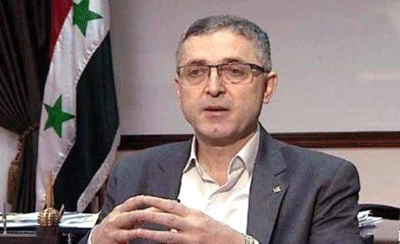Ali Haidar raises prospect of free elections in response to surprise change of line by Syrian National Coalition leader.
The Syrian government is ready to send a minister abroad for talks with Moaz al-Khatib, leader of the opposition Syrian National Coalition, who recently threw “rebel” politics into turmoil by coming out in favour of dialogue with the regime.
“I am willing to meet Mr Khatib in any foreign city where I can go in order to discuss preparations for a national dialogue,” Ali Haidar, the Minister for National Reconciliation, told the Guardian. His remarks were the most positive response the Syrian government has yet given to the opposition leader’s surprise change of line.
In explaining the purpose of the national dialogue, Haidar raised the prospect of a genuine contest for a multiparty parliament and for the presidency when Assad’s mandate runs out next year.
“The dialogue is a means to provide a mechanism for reaching free parliamentary and presidential elections. This is one of the subjects which will be discussed at the table. Such a thing could be the result of negotiations, but not a precondition,” he said. “We reject a dialogue that is just to hand power from one side to another.”
President Al-Assad offered talks with opposition leaders in a speech last month. But he appeared to rule out any contact with the Syrian National Coalition, which was put together under US, Turkish and Qatari pressure in Doha last summer in an attempt to unite the disparate opposition groups.
“Who do we conduct dialogue with? Those who are carrying extremist thinking and do not believe in anything except blood, killing and terrorism? Should we speak to gangs that receive their orders from abroad to reject dialogue because they believe that dialogue will foil their schemes aimed at weakening Syria?” Assad said.
Khatib’s political bombshell came three weeks later, prompting debate in Syrian government circles. They also noted last week’s revelations that Barack Obama rejected Pentagon and state department recommendations to arm the opposition. The US has since come out in support of Khatib’s initiative, and there is speculation in Damascus that it was co-ordinated in advance with Washington.
Haidar’s offer to meet the coalition leader is clearly designed to prevent Khatib’s initiative from collapsing under resistance from “rebel” colleagues. Haidar pointed out that like other regime ministers he was banned from the EU under sanctions, but said Geneva was a possible venue for preliminary talks. “But we insist that the actual national dialogue take place on Syrian soil because it is a matter of Syrian dignity,” he added.
He recognized that exiled politicians were concerned about being arrested if they returned to Syria. In announcing his shift toward negotiations, Khatib demanded the government renew the passports of all Syrians who were overseas so they ceased to be stateless. Haidar said the Justice Ministry had already started taking steps to cancel any proceedings against Syrians overseas.
“The ministry of the interior has agreed to relax its policies and give them all the necessary documents to return and let them in even if they don’t have any. I don’t want to close the door to any opposition people who have concerns. I personally invite anyone to return and guarantee their safe entry and departure, if that’s what they want,” Haidar said.
He made it clear the new impetus for negotiations came not just from Khatib’s policy switch but from a change in the regional and international climate, as well as because of the military stalemate. “There are hardliners on both sides but 80% on each side now realise that no military victory is possible. I’m in contact by phone with some leaders of the Free Syrian Army and they used to say, ‘We’ll be in Damascus in a few days’ time,’ but today they say, ‘We’ve found out that the international community is playing games with us and working for their own interests only so we realise we can’t defeat the Syrian army,'” he said.
In spite of the Syrian government’s apparent readiness to talk to representatives of the armed opposition, differences remain over the shape of any transition. Russia, the US and several other key players including Britain and France agreed in Geneva in June that one element should be the appointment of a coalition government that could include members of the opposition as well as the present government and would have “full executive powers”.
“In his discussions here it was Brahimi who said it was a bit early to form a government. His point was that it’s not possible because there are so many factions in opposition in exile who are not yet ready to participate. Unfortunately, when he left Syria we heard something else from him,” Haidar said. “There were contradictions in his statements which weakened his position of being equidistant from all Syrians. We wouldn’t say his mission has completely failed but he has to regain his previous position of equidistance.”
Haidar’s conciliatory views confirm his reputation as a regime dove. As leader of the Syrian Social Nationalist party, a small opposition party, he was among a group published the Damascus declaration, a manifesto for democratic reform and radical political change, in 2005. Some were jailed and others went into exile. He remained in Damascus and was appointed a minister in 2011. He continues to have differences with the regime and during last year’s referendum on a new constitution he appeared three times on state TV calling on voters to reject it.
Under the constitution Assad would be entitled to put himself forward for a new term next year, after two terms in office. Haidar suggested Assad should do so unless the national dialogue resulted in major changes. “Personally I have not discussed this with the president. But the current constitution does not prevent him running. As a Syrian citizen he has the right like any other citizen,” he said.
Dr. Mohammad Abdo Al-Ibrahim

